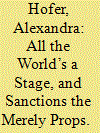| Srl | Item |
| 1 |
ID:
177858


|
|
|
|
|
| Summary/Abstract |
This article argues that sanctions are interactional tools; their interactive nature is evident if these measures are considered as a form of stigmatization, which is the outcome of an interaction between the group imposing the stigma and the actor that is stigmatized. Stigmatized states do not always accept the label that is placed upon them and can adopt strategies to counter or resist stigma. From a symbolic interactionalist perspective, this can be understood as a state’s foreign policy role. Such an approach is illustrated through a study of Russia’s response to being sanctioned by the EU and the US for its policies in the Ukrainian crisis. It is argued that Russian leaders are unlikely to cave into Western pressure because they reject the role of deviant that is placed upon their state and instead adopt the role of the ‘untouchable’ state, which is consistent with Russia’s great power identity. Though the sanctions may enable the EU and the US to activate their roles as normative powers, in the context of the Ukrainian crisis, they have locked the parties into roles that contribute to the crisis’ duration.
|
|
|
|
|
|
|
|
|
|
|
|
|
|
|
|
| 2 |
ID:
155105


|
|
|
|
|
| Summary/Abstract |
Unilateral coercive measures are condemned by the UN General Assembly on a yearly basis for being contrary to international law and for having negative effects on human rights and the economy of developing States. Although legal doctrine generally finds that the limitations of economic coercion are a grey area of international law, these resolutions could be indicative of an emerging prohibition. Upon closer scrutiny, however, it would appear that they do not satisfy the required criteria—as developed by international jurisprudence and doctrine—for establishing a new custom. That being said, the resolutions clearly illustrate a divide between developed and developing States on the legitimacy of unilateral sanctions that should not be dismissed. In the interests of understanding how this division came into existence and how we can overcome it, the article proceeds to address the social factors that lead to its creation.
|
|
|
|
|
|
|
|
|
|
|
|
|
|
|
|